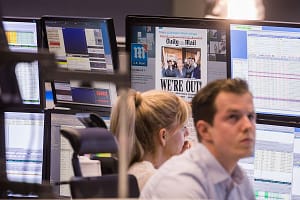This is an excerpt from our e-guide,BUSINESS ANYWHERE – The ultimate guide to flexible working, produced in partnership with Microsoft
The basic issue with flexible working is just what is it?
One of the challenges I consistently see is that when I say “flexible working”, most people hear “working from home”. And actually, flexible working is not necessarily working from home.
Flexible working is about being able to make a choice, on any given day, about the most appropriate location for the work you’re about to do.
It’s about being empowered by your organisation to make that choice. This empowerment comes in two ways – firstly, the culture within the organisation that supports people to work flexibly, and secondly, giving flexible workers the right tools to work effectively.
Employers need to understand that flexible working is fundamental to the workplace today. The reality is that most of our workplaces aren’t conducive to all the kinds of work we have to do. The open-plan office is a classic example of this – it’s brilliant to see loads of people but it’s terrible if you’ve got to get lots of work done. The simple reality is that the human brain can’t cope with lots of distractions. What tends to happen is that you sit down to work and your colleague comes over or your phone rings. You then start to lose focus and can’t be productive in that environment.
Flexible working becomes crucial here – it allows individuals to be deeply productive and find an environment where they can get their work done. That doesn’t necessarily mean home.
My personal example is that there are two places I cannot be deeply productive at – it’s the office and my home. These are the two places I get distracted from the task at hand. When I want to be productive, I go and find a coffee shop where I can sit, be anonymous, and get on with I’m doing. The other option for me is going to the library and getting my work done.
Connecting with customers
A central component of flexible working is thinking about relationships. Flexible working helps you spend more time with your customers, partners or colleagues. Many of us find it easier to say “Monday to Friday, 9am-5pm, I’m going to be sitting in my office”. But actually, with the right culture and tools, why can’t we work from our customers’ premises or anywhere? We should be more connected to our customers and interact with them – flexible working can make that happen.
Give employees a better life
The other part of flexible working is the time of work as much as the location. Flexible working should actually empower employees to choose the most appropriate time to do the work that needs to done and fit your life in around it.
For example, if I want to take my son to school or the zoo in half-term, I should be able to do that as long as I’m not missing any customer meetings or other appointments. I know as I result of doing that, I’ll have to work that evening or over the weekend but fundamentally I get to make a choice that’s most appropriate to me for the moments that matter in my life.
Basically, when you start working flexibly, the whole concept of work-life balance being a binary thing starts going away.
Productivity vs Presenteeism
One of things that we found in our research about flexible working is trust. Our research suggests that because all employees don’t have the same package for flexible working, you get this really weird dynamic of resentment and mistrust where the team starts questioning where their flexible-working colleague is.
This makes the individual working remotely paranoid. So, when they’re not working from the office they start worrying about presenteeism and start over-communicating. They get up early, send lots of emails, and make a lot of phone calls to tell people they are working. This destroys all the benefits of flexible working.
The answer to this goes back to employers. We believe that flexible working is something that offers an organisation a strategic operational opportunity and so actually you should make it available to everybody.
At Microsoft, we’re measured by the output and not by the hours we work. Microsoft doesn’t really care about where I’m working from, it trusts me as a professional to make those decisions in the best interests of both me and the organisation. It’s the cultural things about measuring the output of work rather than the process of work that matter the most.
It’s high time employers understand they need to empower employees with tools so that they can be effective from anywhere – not just in the office.









Leave a Comment